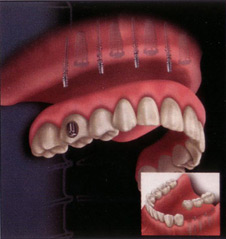A denture is a removable replacement for missing teeth and surrounding tissue. Two types of dentures are available.
Complete Dentures: Complete dentures can be either “conventional” or “immediate”.
Conventional dentures are made after the teeth have been removed and the gum tissue has begun to heal. They are typically ready for placement 8 to 12 weeks later, so a patient may have to be without teeth for a period of time. Immediate dentures are made in advance and can be positioned as soon the teeth are removed. However, since bones and gums shrink during the healing process, they will require more adjustments to fit properly and they are less accurate in their initial fit. They should generally be considered a temporary solution until conventional dentures can be made.
Partial Dentures: A removable partial denture or bridge usually consists of replacement teeth attached to a pink or gum coloured plastic base, which is connected to a metal framework that holds the denture in place. Partial dentures are used when one or more natural teeth remain in the upper or lower jaw.
The process of making dentures requires about 1 month and several appointments. The general steps are:
New dentures may feel odd or loose for the first few weeks. Your cheek muscles and tongue will get used to keeping them in place and you will get more comfortable inserting and removing them. Also, it is not unusual for minor irritation or soreness to occur and for your saliva flow to increase when you first start wearing your new dentures.
Eating: Eating may take practice. To get used to your new dentures, start with soft foods cut into smaller pieces. Chew slowly with both sides of your mouth. Be cautious with hot or hard foods and sharp edged bones or shells. Do not use toothpicks with your dentures.
Speaking: You may have difficulty pronouncing certain words with your new dentures but as you get used to them, your speech will return to normal. If your dentures “click” when you speak contact your dentist. On occasion, your dentures may slip when you laugh, cough or smile. Reposition them by gently biting down and swallowing.
Bedtime: Generally, dentures should be removed before you go to bed and put back in when you wake up. However, in the first few days, your dentist may ask you to wear your dentures continuously. This allows for a quicker assessment of any adjustments that are required.

Dental adhesives are safe as long as they are used the way they are meant to be. If the denture is well-fitting and the adhesive is used only to create added stability, there should be no problem.
Proper denture care is important for both your dentures and your mouth.
Handling: To avoid accidentally breaking your dentures, stand over a folded towel or sink full of water when handling them.
Brushing/Rinsing: Brushing help to remove stains, plaque and food from your dentures. Use a brush with soft bristles designed for cleaning dentures. Gently brush all of the surfaces and be careful not to damage the plastic or bend any attachments. Ultrasonic devices can be used. These are “mini-bathtub like” devices that use sound waves and a cleaning solution to clean your dentures. They do not, however, replace daily brushing. In between brushing, rinse your dentures after every meal.
Denture Cleaners: Hand soap or mild dish washing liquid are acceptable cleaners for your dentures. Household cleaners and many toothpastes can be too abrasive and should not be used. Your dentist may recommend products that have been evaluated for effectiveness and safety.
Storage: Dentures need to be kept moist when they are not being used to avoid them drying out or loosing their shape. Store your dentures in a soaking solution or in water (do not use hot water). If your dentures have metal attachments, these could tarnish in a soaking solution. Ask your dentist which method is best for your specific denture.
Repair: Dentures should never be repaired or adjusted at home. Bending the metal or clasp may weaken the structure. Do-it-yourself kits can permanently damage your dentures and over the counter glues may contain harmful chemicals. If you are having any problems with the fit or comfort of your dentures, see your dentist for an adjustment. If your denture chips, breaks, crack or a tooth comes loose, often your dentist can repair it the same day.